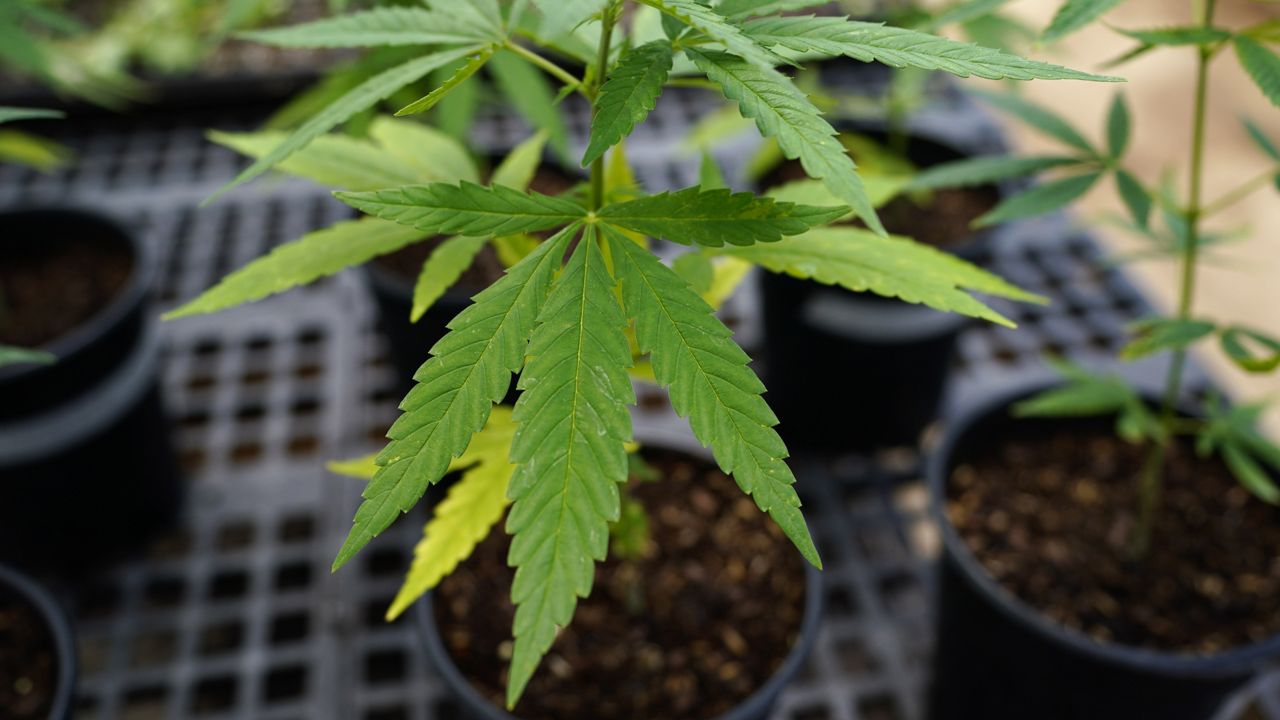WILSON, N.C. (AP) — Wilson County’s only commercial hemp grower says if medical marijuana becomes legal in North Carolina, he will be a good candidate to grow it with the knowledge he has gained.
Delmer Langley, owner of D.E.L. Hemp Farm, received a license to grow hemp from the U.S. Department of Agriculture on Jan. 7, following the Jan. 1 transfer of hemp regulatory control from the North Carolina Department of Agriculture’s N.C. Industrial Hemp Program administered by the N.C. Hemp Commission.
Langley said he is pleased with the federal regulatory control, from the testing to the ease of access to federal officials.
“You’ve got to be FBI fingerprinted before you can get your license,” said Langley, who runs a rural farm in western Wilson County.
Langley put his first hemp plants into the ground on April 16, 2019, and now harvests hemp about every five weeks from four climate-controlled, grow-lighted greenhouses.
The first couple of years were tough for Langley, who struggled to pay his bills with the meager proceeds from his crop of CBD hemp.
But since then, things have turned around and business is good for Langley, whose smokeable hemp, hemp tinctures, salves and hemp gummies have been selling well at hemp stores, vape stores, hardware stores and truck stops up and down the East Coast.
Langley is sold on the curative capabilities of the cannabis sativa plant and is poised to use the knowledge he has gained from growing hemp to use in growing medical marijuana if North Carolina follows the majority of other U.S. states in decriminalizing it for medicinal uses.
“Medical marijuana is coming real quick,” Langley said.
The North Carolina Compassionate Care Act, a bill currently being considered in the General Assembly, would “prioritize the protection of public health and safety in the creation of a system for the cultivation, processing and selling of medical cannabis.”
Rep. Linda Cooper-Suggs, D-Wilson, a backer of the bill, recently visited Langley’s operation.
“I have had the good fortune of going out and spending about two hours with him, listening and seeing the entire operation and how truly complex it is,” Cooper-Suggs said.
The legislator said the bill may pass the Senate during this short session, which begins May 18.
If it passes the Senate, it would then come to the House.
“We can relieve citizens by passing this bill,” Cooper-Suggs said. “Medical marijuana can bring needed pain relief to some patients if prescribed and used properly, and it has to be regulated.”
Cooper-Suggs said access to medical marijuana will help patients escape dependency on opioids.
“We know that the opioids are easily abused and we have a major societal problem with opioid abuse,” she said.
Cooper-Suggs said North Carolina should learn from the 36 states that have already found ways to legalize medical marijuana.
“We must guard against cannabis grown outside of a legal framework,” Cooper Suggs said. “As we see with Mr. Langley, everything is controlled. It is a controlled environment. We should carefully regulate it, and we should also prevent underage use once it is passed. And we should fund strong programs to educate potential users.”
Cooper-Suggs said “we in the South should be the gold standard for implementing a framework that allows North Carolinians to benefit from raising, producing and selling cannabis.”
The representative said safeguards should be put in place for medical marijuana that are even stronger than the state’s Alcohol Beverage Control system for liquor.
“Also, we should use the revenue to support a robust public health advocacy campaign,” Cooper Suggs said.
The bill calls for some 10% of revenue from medical marijuana suppliers to be given to the state.
“I look forward to this bill, Senate Bill 711, coming to the House as we enter this short session so that we can relieve and also bring industry into North Carolina,” Cooper-Suggs said. “I am very positive about it. I hope that it can be a bipartisan bill, because it would benefit our state. It would benefit persons who are in pain, from small children with these grand mal seizures and how medical marijuana can help them and their families.
“I look forward to us working together to be able to pass this bill, so I am very positive.”
Chris Flippo, a USDA-certified retailer of hemp products including some of Langley’s products, plans to open a retail cannabis sales and distribution location called Hero Medz this month.
He and his wife Jessica Flippo currently sell their products out of a tiny office in Wilson.
“In a year, I would love to hear that I was at least working with a company that had a medical marijuana license or that I had one myself, that would be even better,” Flippo said.
Flippo, who was one of the first hemp growers in Wilson County, said Langley’s hemp is always grown with perfection and consistency.
Langley admits that he has learned an immense amount through trial and error and could actually train others how to best grow cannabis.
“I think I would be one of the experienced growers to where if it becomes available that I would consider it,” Langley said. “I already know what’s going to be done with this place. It’s going to look like Fort Knox.”



